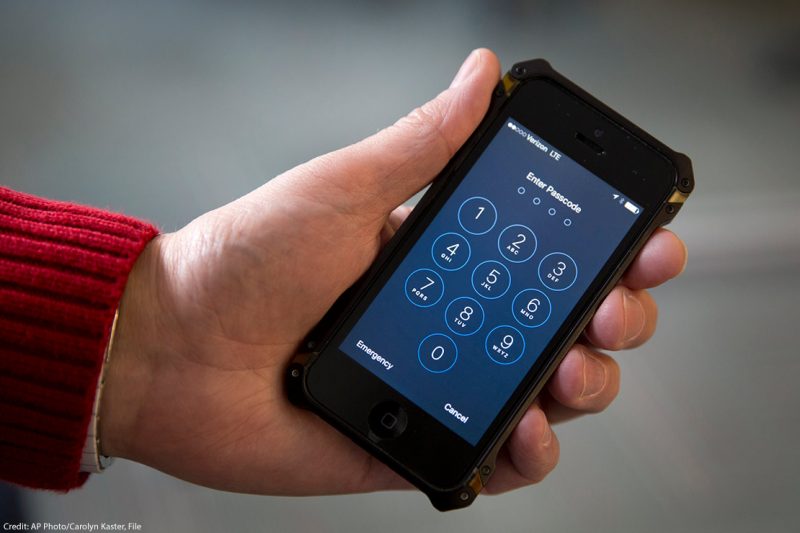Police Must Not Create Digital Dossiers of Data from our Phones and Computers


UPDATE (7/27/21): The ACLU and ACLU of Texas filed a new amicus brief arguing for robust constitutional limits on searches and seizures of smartphones and computers. In this case, United States v. Morton, pending in the Fifth Circuit, investigators got a warrant to search a man’s cell phone merely because he was allegedly in possession of drugs, and then searched the photographs on the phone. Our brief argues that the Fourth Amendment does not permit searches without a factual basis and limits investigators to looking only at categories of data where evidence could be found.
Think about all the information stored on your cell phone or computers — photos, texts, location data, and even more information generated by a multitude of apps. These tools are convenient and integral to our everyday lives. But what does that mean for our privacy rights in the digital age? Today, the Wisconsin Supreme Court hears oral arguments addressing this question, including arguments that the ACLU has presented in a series of amicus briefs.
The Wisconsin case concerns cell phone data seized by the police. During a hit-and-run investigation in 2016, a suspect, George Burch, consented to a police search of his text messages to confirm his alibi at the time of the accident. The police should have just downloaded the text messages and returned the information after the investigation ended. Instead, they downloaded the entire contents of Burch’s phone and held onto all the data. Months later, an entirely different law enforcement agency found out that police still had the information and searched it for evidence of Burch’s involvement in a murder — without getting a separate warrant or asking his permission. That search — which went well beyond the agreed upon text messages and hit-and-run investigation — led to evidence linking Burch to the murder.
If police want to lawfully access seized data for a separate investigation, at the very least they must obtain a second search warrant. Without a warrant, there is no way to ensure that the police are acting with good cause, rather than just rummaging through private data for improper reasons, or for no reason at all. Once an investigation is over, the police are required to return or delete information seized.
The ACLU has been fighting unconstitutional search and seizure practices by law enforcement for years. In 2015, we filed an amicus brief in United States v. Ganias, a case in the Second Circuit Court of Appeals concerning the FBI’s retention of electronic records seized in a fraud investigation, which it held onto and later searched to investigate a different fraud suspect over two years later. While a panel of judges agreed with us that the retention of this data was unconstitutional, the full Second Circuit did not rule on this particular legal question, and the problem persists.
In 2014, we filed an amicus brief in United States v. Hasbajrami, a case involving warrantless foreign intelligence surveillance. In that case, the Second Circuit issued an opinion holding that subsequent querying of stored information may, depending on the circumstances, be regulated by the Fourth Amendment and require a warrant.
In the past year, we’ve filed two other amicus briefs in state Supreme Courts on the same issue — in these cases, as in Burch, police didn’t bother to get a second warrant.
In State of Michigan v. Hughes, police seized the defendant’s cell phones in conjunction with a drug trafficking offense to which he pleaded guilty. The defendant was also suspected of armed robbery. A jury hung failed to convict him not once but twice. Unsatisfied, at the third trial, the prosecution introduced evidence obtained by searching the cell phones for evidence of the robbery, a crime for which they did not have a warrant.
In State of Illinois v. McCavitt, law enforcement obtained a search warrant to investigate a police officer for several crimes against a single victim. Eight months later, the officer was acquitted. The next day, law enforcement — still in possession of the defendant’s hard drive under the first warrant — conducted a new search of the hard drive data, hoping to find evidence of different crimes against additional victims.
As these three state Supreme Court cases illustrate, courts are starting to scrutinize broad, free-wheeling searches of the libraries’ worth of sensitive, private information stored on our electronic devices. None of them have ruled yet. But our briefs explain that the Fourth Amendment can and must effectively limit searches and seizures in the digital age, preventing the founders’ reviled “general search” — rummaging through private data for any or no cause and without judicial oversight. Nor should our private information stay in government hands forever. At some point, the constitutional requirement of reasonableness means that our documents, photos, and messages get returned or deleted.
The government should not take advantage of its investigatory powers to build permanent digital dossiers just in case. To retain this information is a moral hazard, putting privacy and other civil rights and civil liberties at risk of an all-seeing government eye.



